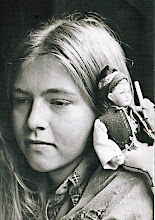One of the things that differentiates today's view from yesterday's is the forms of transportation. These cards only show people on foot along with one lone horse-drawn cart. Today, you would see some cars, motorcycles and mopeds, but you would also see thousands of bicycles. The bicyclists do not wear any fancy bike gear though, no spandex racing outfits like we might see here in the United States. On our recent trip, we didn't see any helmets either, just typical street clothes, although sometimes the bicyclist might be holding an umbrella or a cup of coffee. All very casual. Here's a night view from the living room of the place where we were staying.
And here is a view of the bicycle parking garage near the train station. I'm afraid I would never find my bike.
Unfortunately, there are no messages on the backs of these cards, but there are interesting instructions in the stamp box. If you wanted to send the card at the less expensive printed-material rate, you were instructed to cross out Briefkaart and Carte Postale. At this less expensive rate, you were only permitted to include the name and date, no message was allowed. This was not unique to the Netherlands. I have seen it on cards from a number of different countries, but I've never seen the rules spelled out like this. The backs of both cards look the same, so I'm only including one.






















